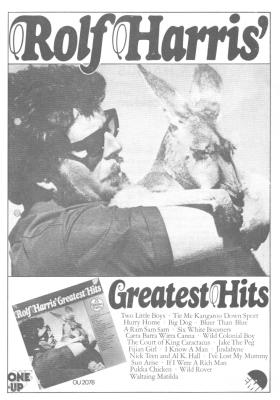

Programme

Overture – The Geoff Alderson orchestra
The Pamela Devis dancers and Geoff Alderson singers introduce
Cannon and Ball, and
The Dallas Boys
Introducing the star of our show
Rolf Harris
Johnyy Hutch’s halfwits
Britains craziest acrobats
Cannon and Ball
They go with a bang
Rolf Harris
Rolf paints a song, helped by the boys and girls
The Dallas Boys
Interval
Rolf Harris
Finale – The Company
Production directed by Peter Sontar
Choreography by Pamela Devis
Decor designed and constructed by Brunshill and Kingman Ltd
The Geoff Alderson singers: Phil Heathcoate, Graham Cole, Lynn J. Summers, Kay Cordell
Rolf Harris
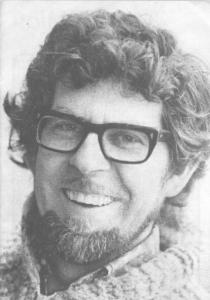
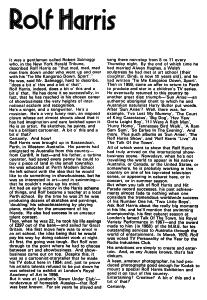 It was a gentleman called Robert Salmaggi who, in the New York Herald Tribune, described Rolf Harris as “that mad, mad, mad man from down under who went up and over with his ‘Tie Me Kangaroo Down, Sport.'” He was, said Mr. Salmaggi, hard to describe, “does a bit o’ this and a bit o’ that”.
It was a gentleman called Robert Salmaggi who, in the New York Herald Tribune, described Rolf Harris as “that mad, mad, mad man from down under who went up and over with his ‘Tie Me Kangaroo Down, Sport.'” He was, said Mr. Salmaggi, hard to describe, “does a bit o’ this and a bit o’ that”.
Rolf Harris, indeed, does a bit o’ this and a bit o’ that. He has done it so successfully, in fact, that he has reached in his chosen career of showbusiness the very heights of international acclaim and recognition.
He’s a singer, and a songwriter. He’s a musician. He’s a very funny man, an inspired clown whose act almost shouts aloud that it has had imagination and care lavished upon it. He is an artist. He sketches, he paints, and he’s a brilliant cartoonist. A bit o’ this and a bit o’ that? Certainly. And how!
Rolf Harris was brought up in Bassendean, Perth, in Western Australia. His parents had emigrated to Australia from this country – from Cardiff, in fact – and his father, a turbine operator, had saved every penny he could to buy a piece of land in the small township. He was educated at Perth Modern School. He left school with the idea that he would like to do something in showbusiness, but he was so interested in art – and in swimming – that he couldn’t make up his mind.
Art had an early victory in the Harris scheme of things, and Rolf became a teacher at a local Perth school. By the time he was 21 he was producing dozens of sketches and paintings, ‘doubling’ his schoolmastering by playing piano, mainly for the amusement of his friends. He also had success in an amateur talent contest.
Then, when he was 22, he took his life savings of �297 out of the bank – and sailed for Great Britain. His first move here was to enrol in an art school, the idea being that he would pay his way by doing cabaret work at night. At first, the going was tough. But Rolf won through to the point where he had to choose between art and showbusiness. And showbusiness came out on top. Despite this, it was as a cartoonist-storyteller that he made his TV debut here in 1954; and, just to prove his artistic talents refused to be put down, he was selected to exhibit at London’s Royal Academy of Art tn 1956.
But it was at London’s ‘Down Under Club’ – rendezvous of homesick Aussies – that Rolf was best known. For six years he played and sang there non-stop from 8 to 11 every Thursday night. By the end of which time he had married Alwen Hughes, a Welsh sculptress he had met at art school (their daughter, Bindi, is now 11 years old), and he had written ‘Tie Me Kangaroo Down, Sport’. Then in 1959 came an offer to return to Perth to produce and star in a children’s TV series.
He eventually returned to this country to another great disc triumph – Sun Arise – an authentic aboriginal chant to which he and Australian naturalist Harry Butler put words. After ‘Sun Arise’? Well, there was, for example. ‘I’ve Lost My Mummy’, ‘The Court of King Caractacus`, ‘Big Dog’, ‘Hev Yew Gotta Loight Boy’, `If I Were A Rich Man’, ‘Hurry Home’, ‘Tennessee Bird Walk’, ‘A Ram Sam Sam’, ‘So Earlye In The Evening’. And more. Plus such albums as ‘Sun Arise’, ‘The Rolf Harris Show’, and ‘Rolf Harris “Live” At The Talk Of the Town’.
All of which went to show that Rolf Harris had truly arrived on the international showbusiness scene. Nowadays. when he’s not travelling the world to appear in his native Australia, or Canada, or the United States, or somewhere, he is probably working in this country on one of his top-rated television series, or appearing in cabaret here, or in concert, or in summer season.
But when you talk of Rolf Harris and Hit Parade record successes, his past achievements almost fade to nothing when one considers the tremendous worldwide success of his Number One hit, ‘Two Little Boys’.
Ask Rolf Harris about the really big moments in his life, and he’ll mention that swimming championship, his first cabaret season at London’s famed Talk Of The Town, his Royal Variety Performance in 1967 – and the award made to him (in 1968) of the M.B.E. for his outstanding services to Australia through the world of entertainment. In March, 1970, Rolf was voted TV Personality of the Year by the Radio Industries Club.
His ambitions are simply to create and entertain. And, as any Aussie knows, that’s fair dinkum.
A keen, amateur photographer, he had produced photographs good enough for Kodak to mount a special Rolf Harris Exhibition and send it on tour of this country.
Entertaining? Creative? A bit o’ this and a bit o’ that?
Certainly.
Cannon and Ball
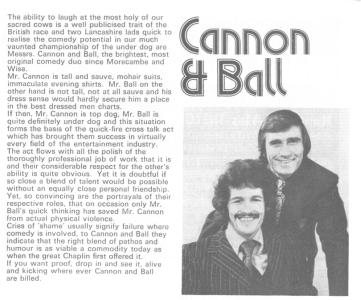 The ability to laugh at the most holy of our sacred cows is a well publicised trait of the British race and two Lancashire lads quick to realise the comedy potential in our much vaunted championship of the underdog are Messrs. Cannon and Ball, the brightest, most original comedy duo since Morecambe and Wise.
The ability to laugh at the most holy of our sacred cows is a well publicised trait of the British race and two Lancashire lads quick to realise the comedy potential in our much vaunted championship of the underdog are Messrs. Cannon and Ball, the brightest, most original comedy duo since Morecambe and Wise.
Mr Cannon is tall and suave, mohair suits, immaculate evening shirts. Mr Ball on the other hand is not tall, not at all suave and his dress sense would hardly secure him a place in the best dressed men charts.
If, then, Mr Cannon is top dog, Mr Ball is definitely under dog and this situation forms the basis of the quick-fire cross talk act which has brought them success in virtually every field of the entertainment industry.
The act flows with all the polish of the thoroughly professional job of work that it is and their considerable respect for the other’s ability is quite obvious. Yet it is doubtful if so close a blend of talent would be possible without an equally close personal friendship. Yet, so convincing are the portrayals of their respective roles, that on occasion only Mr Balls quick thinking has saved Mr. Cannon from actual physical violence.
Cries of ‘shame’ usually signify failure where comedy is involved, to Cannon and Ball they indicate that the right blend of pathos and humour is as viable a commodity today as when the great Chaplin first offered it.
If you want proof, drop in and see it, alive and kicking wherever Cannon and Ball are billed.
The Dallas Boys
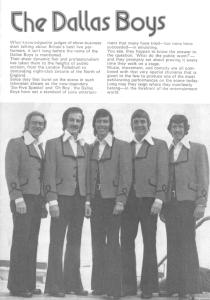 When knowledgeable judjes of show-business start talking about Britains best live performers, it isn’t long before the name of the Dallas Boys is mentioned.
When knowledgeable judjes of show-business start talking about Britains best live performers, it isn’t long before the name of the Dallas Boys is mentioned.
Their sheer dynamic flair and professionalism has taken them to the heights of public acclaim, from the London Palladium to demanding night-club circuits of the North of England.
Since they first burst on the scene in such television shows as the now legendary ‘Six-Five Special’ and ‘Oh Boy’, the Dallas Boys have set a standard of pure entertainment that many have tried – but none have succeeded – in emulating.
You see, they happen to know the answer to the question ‘What do the public want?’ – and they promptly set about proving it every time they walk on a stage.
Music, movement and comedy are all combined with that very special charisma that is given to the few to produce one of the most exhilarating performances on the scene today. Long may they reign where they manifestly belong – in the forefront of the entertainment world.
